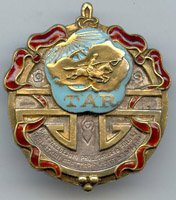|
 The first constitution of Republic Tannu-Tuva ulus (Uriangkhai nation), was adopted 90 years ago, on 15 August 1921. This article about that event is based on archival materials. The first constitution of Republic Tannu-Tuva ulus (Uriangkhai nation), was adopted 90 years ago, on 15 August 1921. This article about that event is based on archival materials.
The Pan-Tuvan Founders' khural (Congress), which took place from 13 to 16 August 1921 in Sug-Bazhy near Russian village Atamanovka (now Kochetovo), two projects of the Foundation Law, similar in content and intent, were evaluated. On 14 August 1921, a third project was reviewed, concerning the Constitution of Tannu-Tuva ulus. The soviet delegation was the first to present their project. Representative of khoshun Maady was for accepting it without discussion. Buyan-Badyrgy protested that even if Maady khoshun wishes to accept the constitution without argument, they can do it. However, that should not deprive the other khoshuns of the possibility to review and discuss all the matters stated in the constitution, independently from how the Maady delegation feels. Then Comrade Safianov's proposal to translate the constitution into Tannu-Tuva language and preliminary evaluation of it by Tuvan delegates was voted on and accepted.
On the next day, 15 August 1921, opening the next meeting, Buyan-Badyrgy announced: Khemchik delegates "have worked out their own constitution at home, which included all the paragraphs of the project presented at the Congress, except for five of them. For us, only one of these five paragraphs is unacceptable, namely, in justice, which states that physical force in interrogation of a defendant is abolished. "In a case where there are no eye-witnesses, and the defendant refuses to confess, we now cannot use canes and other means of physical force during investigations of criminals." All other khoshuns seconded this opinion."
The disputed point was to be evaluated. Representatives of Soviet Russia and revolutionary Mongolia convinced Tuvan delegates that imprisonment and forced labor was preferable to punishment by caning.
"…Afterwards the Chairman of the Congress, Buyan-Badyrgy announced that all representatives of Tannu-Tuva, having heard and understood the explanations, now agreed with the Russian delegation to completely abolish physical punishment and torture, and are prepared to adopt the paragraph of the constitution about law enforcement in its original form. After that, all the paragraphs of the Constitution of Republic Tannu-Tuva ulus (Uriangkhai nation) were announced in Russian, Tuvan and Mongolian languages and adopted by the delegates of the Khural unanimously. That was the first constitution of TNR, which contained 22 paragraphs.
The first paragraph of the constitution adopted by the Congress stated that "Republic Tannu-Tuva ulus is free, not dependent on any other entity in its internal affairs and self-administration by the people of Tannu-Tuva. In international relations,, the republic acts under the protectorate of Soviet Russia." The TNR constitution spoke of the education of the nation and improving its cultural level, health care, government means for improving the economic situation of the country with the help of the other republics, preventing the takeover of the country by foreign capitalists. The constitution gave the citizens the right to follow whatever religion they preferred. The seventh paragraph of the constitution stated that "punishment by caning, chaining people in blocks and torture during interrogation were to be substituted by fines and forced labor. Fines extracted from well-to-do peole were to be used for the good of the general public, and they were to be sentenced to forced labor according to the decision of the court; those without any property were to be sentenced to public works. A House of imprisonment of the central administration of the republic was to be set up for those sentenced to public works.
The supreme legislative rule in the republic was to be effected by the congress of all the khoshuns, composed of representatives of the people and was called at least once every year. Delegates to the General Congress were elected separately from each khoshun at general meetings of the sumo (sumon) in numbers proportionate to the population of each sumo, but no fewer that two people from the least populated sumo . The supreme executive rule was to be performed by the General Central Soviet (Government), which consisted of one person from each khoshun. Between the meetings, all the authority belonged to the Central Soviet, which met for regular sessions at least four times a year. Between sessions, the Soviet activities were to be led by one of the members of the Soviet (Government). Each khoshun was to be administered by a head of the khoshun with three aides, which were to be elected at a khoshun meeting.
Paragraphs 17-22 of the Constitution stated that "…sumo are to be administered by collective soviets of three persons, elected at meetings of the sumo. All the officials of the khoshuns and sumo are confirmed by the general khoshun congress. Sumo collectives will call sumo meetings as needed, where all the general activities of the sumo will be decided. Each sumo is subordinate to the khoshun administration, khoshun is subordinate to the Central Soviet.. Wrong decisions of sumo or khoshun meetings and matters of various officials may be abolished by the Central Soviet, if they are in conflict with the terms of the constitution. The functions of justice administration are to be performed by a sumo soviet in any particular sumo, and in khoshuns by khoshun collective; matters not within the khoshun jurisdiction are to be dealt with by the Central Soviet (Government)."
|
|
